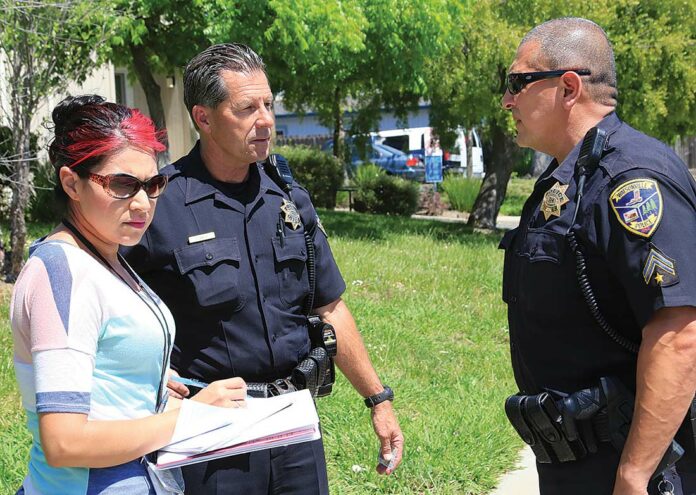
SANTA CRUZ COUNTY—Between June 1 and Aug. 15, law enforcement officers throughout Santa Cruz County responded to 577 calls involving mental health crises, according to a report released Dec. 14 by the Criminal Justice Council of Santa Cruz County (CJC).
The report delves into the way police agencies respond to such calls—which are increasing in number—and highlights a growing need for specialized training to help officers deal with people with mental health needs.
According to the CJC, the report is the County’s first look at how mental health policies played out in local law enforcement agencies.
As part of the study, the county’s law enforcement agencies—Santa Cruz County Sheriff’s Office and police departments in Watsonville, Capitola, Santa Cruz and Scotts Valley—aligned the way they code mental health calls to streamline the way data is analyzed.
“If we want to have a data-informed policymaking process, we need to ensure that we invest the time and effort in setting up viable data collection structures that allow us to better understand what is truly happening at all points of contact through the system,” said CJC Chair and Santa Cruz County Supervisor Zach Friend.
Launched more than three decades ago, the CJC focuses its discussions on prevention, intervention and reentry programs—rather than suppression models, Friend said.
This has included a conference on the role of women and girls in gangs, and work with school districts on reducing youth involvement in gangs.
According to the report, all law enforcement agencies participate in countywide Crisis Intervention Training, and renew their training at least every three years. All agencies also undergo use-of-force training in dealing with mental health calls.
Only 40% of the agencies have written policies regarding arrestees’ medications, but the remaining 60% said they would consider implementing one, the report shows.
The report also looked at the use of mental health professionals who pair with field officers in mental health calls. The three departments that use so-called mental health liaisons—Santa Cruz and Watsonville police departments and the Sheriff’s Office—say they want to increase their programs, which they describe as beneficial. The two that do not have such a program say they want to explore adding it.
Mental health liaisons stated they prefer responding to calls with law enforcement present.
“It was clear that there is strong support for law enforcement partnering with non-sworn mental health liaisons and that agencies are interested in finding ways to invest more resources into those roles, increasing hours and increasing access,” Friend said.
The report shows that 83% of people contacted during a mental health call were transported to the County’s Behavioral Health unit, while 12% went to Dominican Hospital. Just 1% were booked into jail. The remaining 4% were placed in Dominican Hospital’s overflow area, the report shows.
“These calls helps highlight how few of the contacts led to a transport to jail, how many were de-escalated or addressed on the scene by the officers or mental health liaisons and also for those that needed acute help that there is a significant need for more bed and treatment space in our county,” Friend said. “The County has begun to make these investments but more will need to be done to ensure that families have treatment options available for loved ones when it’s needed.”
The picture could soon look brighter for young people in mental health crises after the County Supervisors on Dec. 12 approved the creation of the first residential crisis program for youth.
Friend said that the report highlights several challenges for law enforcement, including the large number of often complex calls and the amount of time and resources that are spent dealing with them.
“We can assume that the report provides a baseline understanding but also most likely an undercount of the true issue, which highlights the growing need to focus additional resources at all stages from prevention to intervention and response,” he said.
For information, visit santacruzcjc.org.













Were half of those calls from Steve?
this service is needed . all you need to do is to look at our streets, and those who post online on this site , filled with rage against the LGBTQ population and a changing society( including the college name change). it is clear that many of these people are NOT well, and desperately need mental therapy. the WPD agrees.
This is what smart gays align with. Not with what you are pushing. https://uploads.disquscdn.com/images/84293b63a59baec01a70442ae251ae4ca725cfe35da1146bed2df2bfe622c330.png https://uploads.disquscdn.com/images/fb43e0f0aa3adfbbca5341bbe404a96a463fd17535be1d3caea6dd586102d530.png https://uploads.disquscdn.com/images/1ffe29af4b9780f27684a78a72a06c5be59d5d9b64c1f516676ea957621875fd.png
The WPD does NOT agree Steve 🤣